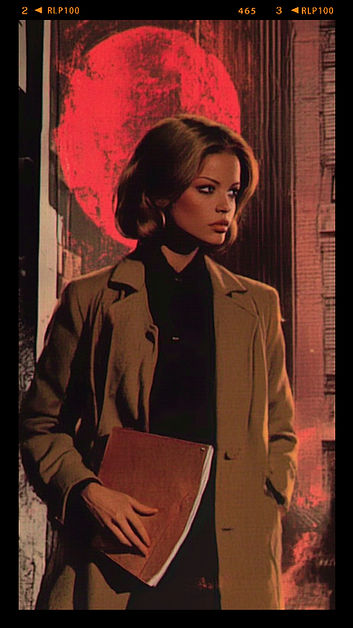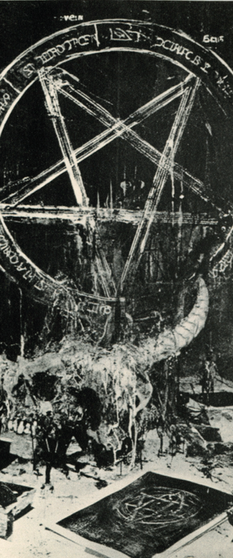

Dante Morricone returns to his native New York City following an extended tour of duty in the Vietnam War, only to confront the grim reality of the city's deterioration. The burden of societal ostracization endured by veterans, compounded by the haunting memories of his involvement in the Phoenix Program, weighs heavily upon Dante. Seeking solace, he reluctantly becomes embroiled in his cousin Valente's illicit dealings, a decision that only serves to amplify his inner turmoil. Amidst this turmoil, Dante serendipitously secures employment as a projectionist, a role reminiscent of his pre-war life. Embracing the opportunity for a fresh start, he endeavours to lead a life of rectitude. However, fate intervenes when a chance encounter with a distressed college student thrusts him into the perilous orbit of a city gripped by fear – a fear perpetuated by a serial killer stalking its streets.

Surviving an attempted assassination, Dante's intervention disrupts the killer's sinister machinations, inadvertently entangling him in a labyrinthine conspiracy. What begins as a quest for personal redemption soon evolves into a harrowing journey to unravel the enigmatic threads of a clandestine network. Assisted by the intrepid Harlem journalist, Stella Muse, Dante delves into the arcane depths of this malevolent force, uncovering a nexus of malevolence stretching back years. Together, Dante and Stella confront not merely a lone homicidal threat, but an intricate web of nefarious actors manipulating the very fabric of New York City. As they peel back the layers of deception, they unearth a sinister cult whose insidious influence has transformed the metropolis into a perilous playground of occult horrors.
Available Now
Sounds of The City

New York City, 1970s
Where Shadows Had an Address
Before the skyline gleamed and the streets were polished for tourists, New York was a living organism, hungry, dangerous, and alive in ways that terrified and thrilled. The city was broke, bleeding, and beautiful. You could smell the oil and rain in the subway tunnels, the garbage fires in vacant lots, the sweat of a thousand dreams clawing their way up from the gutter.
The Bronx was burning. Times Square was a fever dream of peep shows, hustlers, and neon saints. The cops were on strike, the mob ran half the boroughs, and faith, if it existed at all, was traded in whispers and superstition. It was a city where every shadow had a story and every locked door hid something unspeakable.
The war had followed the veterans home; it just changed uniforms. The battlegrounds were alleys now, the enemies ghosts in human skin, politicians, preachers, killers, and the cults that thrived in the cracks of the city’s soul. Yet amid the grime and fear, there was an allure, the pulse of jazz bleeding through the walls of a dive bar, the glow of a marquee promising salvation for two dollars, the fragile beauty of people still daring to dream.
This is 1970s New York, the city of The Projectionist.
A place where sin feels sacred, truth is dangerous, and redemption flickers like an old reel burning through its final frame.
The Son of Sam
The Dark Campaign That Took Over The City

It began like background noise, the usual city madness. Sirens, screams, headlines. But then it changed. There was a pattern to the chaos, a rhythm to the terror. People stopped sitting in parked cars. Lovers hurried home from dimly lit bars. Every shadow became a suspect.
New York in the late 1970s was a city under a curse. The newspapers fed the hysteria, the cops hunted ghosts, and the killers, whoever they were, seemed to understand something about the city no one else did: that fear itself could be worshiped.
Rumours crawled through the boroughs, talk of secret societies, dark rituals, messages buried in the tabloids. Each new murder felt less like a crime and more like a performance, staged for an invisible audience. The city’s pulse slowed. It was no longer the City That Never Sleeps, it was the City That Never Breathed.
And beneath it all, something darker moved, a whisper that the killings were just the surface of a deeper sickness, an unseen cult pulling at the threads of belief, corruption, and madness.
That’s the New York of The Projectionist:
a city where fear is currency, faith is theatre, and the devil doesn’t have to hide, he just has to wait for the lights to go out.

Broken Heroes

Dante Morricone
Occupation: Former Marine, Projectionist Empire Theatre
Age: 29
Setting: Brooklyn / Manhattan, 1973
The war didn’t end when Dante came home, it just changed its shape.
A former Marine haunted by his service in the CIA’s Phoenix Program, Dante Morricone carries his sins like dog tags, invisible but heavy. He’s a man out of step with peace, walking through a city that mirrors the chaos inside him, burnt-out, beautiful, and past saving.
Behind his quiet eyes lies the precision of a soldier and the guilt of a survivor. He’s seen what people do when rules fall away, and he recognizes that same sickness in New York’s streets, a city at war with itself. Working as a projectionist in a 42nd street grindhouse movie theatre, Dante hides from the world’s noise behind reels of celluloid, each frame a fragile illusion of order.
But when violence follows him home, when the killings start to echo the rituals of his past, Dante is pulled back into the light, forced to confront what kind of man he’s become: savior, sinner, or something in between.

Stella Muse
Occupation: Investigative Journalist, Urban Echoes
Age: 26
Setting: Harlem / Midtown, 1973
If Dante is the city’s haunted conscience, Stella Muse is its voice, sharp, fearless, and unwilling to stay silent.
Operating as an investigative journalist for Harlem based magazine Urban Echoes, she came of age in a time when truth was dangerous, and printing it could cost you everything. Stella writes like she’s exorcising something — not just corruption, but the spiritual rot spreading through the city’s veins.
Her journalism walks the thin line between fact and myth, chasing stories that polite society pretends not to see: ritual murders, missing girls, power traded in backroom séances and penthouse prayers. When her investigation crosses paths with Dante’s failed assassination attempt, she becomes both his ally and his mirror, forcing him to face the ghosts he’s tried to bury.
In a world where truth is just another currency, Stella’s courage makes her a target. But her curiosity is as relentless as her faith, and her empathy runs deeper than even she admits.
A Special Report











